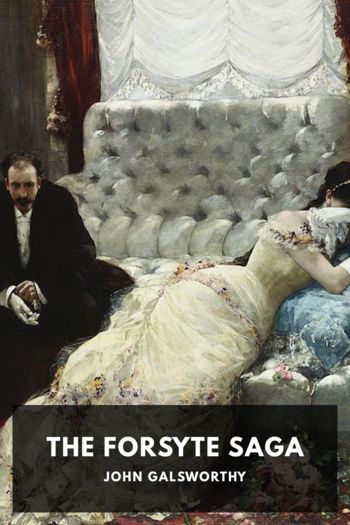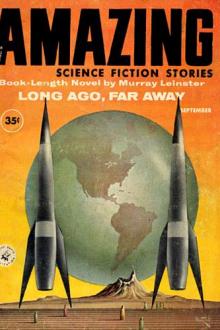The Forsyte Saga - John Galsworthy (best english novels for beginners .txt) 📗

- Author: John Galsworthy
Book online «The Forsyte Saga - John Galsworthy (best english novels for beginners .txt) 📗». Author John Galsworthy
Fleur rose from her chair—swiftly, restlessly; and flung herself down at a writing-table. Seizing ink and writing paper, she began to write as if she had not time to breathe before she got her letter written. And suddenly she saw him. The air of desperate absorption vanished, she smiled, waved a kiss, made a pretty face as if she were a little puzzled and a little bored.
Ah! She was “fine”—“fine!”
III At Robin HillJolyon Forsyte had spent his boy’s nineteenth birthday at Robin Hill, quietly going into his affairs. He did everything quietly now, because his heart was in a poor way, and, like all his family, he disliked the idea of dying. He had never realised how much till one day, two years ago, he had gone to his doctor about certain symptoms, and been told:
“At any moment, on any overstrain.”
He had taken it with a smile—the natural Forsyte reaction against an unpleasant truth. But with an increase of symptoms in the train on the way home, he had realised to the full the sentence hanging over him. To leave Irene, his boy, his home, his work—though he did little enough work now! To leave them for unknown darkness, for the unimaginable state, for such nothingness that he would not even be conscious of wind stirring leaves above his grave, nor of the scent of earth and grass. Of such nothingness that, however hard he might try to conceive it, he never could, and must still hover on the hope that he might see again those he loved! To realise this was to endure very poignant spiritual anguish. Before he reached home that day he had determined to keep it from Irene. He would have to be more careful than man had ever been, for the least thing would give it away and make her as wretched as himself, almost. His doctor had passed him sound in other respects, and seventy was nothing of an age—he would last a long time yet, if he could!
Such a conclusion, followed out for nearly two years, develops to the full the subtler side of character. Naturally not abrupt, except when nervously excited, Jolyon had become control incarnate. The sad patience of old people who cannot exert themselves was masked by a smile which his lips preserved even in private. He devised continually all manner of cover to conceal his enforced lack of exertion.
Mocking himself for so doing, he counterfeited conversion to the Simple Life; gave up wine and cigars, drank a special kind of coffee with no coffee in it. In short, he made himself as safe as a Forsyte in his condition could, under the rose of his mild irony. Secure from discovery, since his wife and son had gone up to Town, he had spent the fine May day quietly arranging his papers, that he might die tomorrow without inconveniencing anyone, giving in fact a final polish to his terrestrial state. Having docketed and enclosed it in his father’s old Chinese cabinet, he put the key into an envelope, wrote the words outside: “Key of the Chinese cabinet, wherein will be found the exact state of me, J. F.,” and put it in his breast-pocket, where it would be always about him, in case of accident. Then, ringing for tea, he went out to have it under the old oak-tree.
All are under sentence of death; Jolyon, whose sentence was but a little more precise and pressing, had become so used to it that he thought habitually, like other people, of other things. He thought of his son now.
Jon was nineteen that day, and Jon had come of late to a decision. Educated neither at Eton like his father, nor at Harrow, like his dead half-brother, but at one of those establishments which, designed to avoid the evil and contain the good of the Public School system, may or may not contain the evil and avoid the good, Jon had left in April perfectly ignorant of what he wanted to become. The War, which had promised to go on forever, had ended just as he was about to join the Army, six months before his time. It had taken him ever since to get used to the idea that he could now choose for himself. He had held with his father several discussions, from which, under a cheery show of being ready for anything—except, of course, the Church, Army, Law, Stage, Stock Exchange, Medicine, Business, and Engineering—Jolyon had gathered rather clearly that Jon wanted to go in for nothing. He himself had felt exactly like that at the same age. With him that pleasant vacuity had soon been ended by an early marriage, and its unhappy consequences. Forced to become an underwriter at Lloyd’s, he had regained prosperity before his artistic talent had outcropped. But having—as the simple say—“learned” his boy to draw pigs and other animals, he knew that Jon would never be a painter, and inclined to the conclusion that his aversion from everything else meant that he was going to be a writer. Holding, however, the view that experience was necessary even for that profession, there seemed to Jolyon nothing in the meantime, for Jon,





Comments (0)